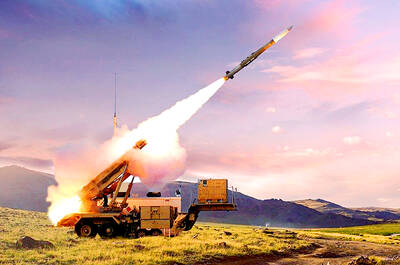The National Health Research Institutes (NHRI) yesterday announced that it would launch nationwide health surveys to better understand the environmental causes of certain diseases.
To protect the environment, ecology and people’s health, several nations have invested huge amounts of money in monitoring chemical substances in the environment and human exposure to them, the NHRI said, adding that it is to collaborate with 11 hospitals to establish the Taiwan Precision Environmental Medicine Alliance to assess environmental health risks in local communities.
Largee human biomonitoring projects assessing environment-related risks and impacts, and generating knowledge about human exposure to chemicals, have been launched worldwide, including the European Human Biomonitoring Initiative in the EU, the National Health and Nutrition Examination Survey in the US, the German Experimental Seismic System in Germany and the Korean National Environmental Health Survey in South Korea, it said.
.jpg)
Photo: Lin Hui-chin, Taipei Times
NHRI National Institute of Environmental Health Sciences Director and distinguished investigator Chen Pau-Chung (陳保中) said environmental medical studies used to be conducted with universities, but the alliance has been established to enhance the clinical applications of the findings, combining the resources of regional healthcare facilities to conduct human biomonitoring surveys according to major environmental issues in each area, assess the health risks of local residents, and offer corresponding healthcare services and practical policy suggestions.
The alliance this month started the first phase of a biomonitoring survey, collecting random blood and urine samples in 40 townships, which would be tested for lead, plasticizers and other toxic heavy metals, he said, adding that the alliance plans to publish annual reports on its findings and analysis.
Chen said it also hopes to answer some of the public’s questions, such as whether levels of lead in the blood have dropped, or how many plasticizers are still detected in the body a decade after the discovery of the illegal use of plasticizers in food additives in 2011, and if new plasticizers are detected.
National Taiwan University (NTU) Cancer Center superintendent James Yang (楊志新) said most cancer patients when they are first diagnosed ask: “Why did I get cancer?”
Aside from individual health conditions, sometimes environmental factors might have contributed to their risk of developing cancer, he said.
Air pollution is associated with the development of lung cancer, radiation exposure is associated with leukemia and thyroid cancer, and a few recent studies have suggested that exposure to excessive amounts of plasticizers might increase the risk of women developing breast cancer, he added.
The alliance is led by the NHRI in collaboration with NTU Hospital, Taipei Veterans General Hospital, the NTU Cancer Center, Taichung Veterans General Hospital, Chung Shan Medical University Hospital and six other hospitals.

OPTIMISTIC: The DGBAS sharply upgraded its GDP growth estimate from 3.54 percent to 7.71 percent after the Taiwan-US trade agreement signing and given AI optimism The US imported more from Taiwan than China for the first time in decades, as US President Donald Trump’s tariffs reshape trade flows while a global boom in artificial intelligence (AI) fuels demand for tech products. US purchases of goods from China plunged almost 44 percent in December last year from 2024 to US$21.1 billion, US Department of Commerce data showed on Thursday. By contrast, shipments from Taiwan more than doubled during the same period to US$24.7 billion. The soaring Taiwanese shipments to the US reflect the huge expansion in supplies of chips and servers for AI companies, which has completely changed

NON-NEGOTIABLE: The US president’s action ran counter to one of the US’ ‘six assurances’ on not consulting China about arms sales to Taiwan, US lawmakers said US President Donald Trump’s admission that he is discussing arms sales to Taiwan with Chinese President Xi Jinping (習近平) is “alarming and a blatant violation of US policy and the six assurances,” US Representative Ro Khanna said on Tuesday. Trump on Monday said he would decide soon on whether to send more weapons to Taiwan, after Xi warned him not to do so. “I’m talking to him about it. We had a good conversation, and we’ll make a determination pretty soon,” Trump told reporters aboard Air Force One when asked about warnings raised by Beijing during a phone call with Xi over

US and Chinese fighter jets briefly faced off above waters near the Korean Peninsula this week, Yonhap News agency reported, marking a rare confrontation in that area between the two superpowers. About 10 US fighter jets on Wednesday departed an airbase in Pyeongtaek, South Korea, for drills above international waters off South Korea’s western coast, the news outlet cited unidentified military sources as saying. While the US planes did not enter China’s air defense identification zone, Beijing scrambled planes as they neared that region, the report said. “The Chinese People’s Liberation Army organized naval and air forces to monitor and effectively respond

VACILLATING? Some US officials are concerned that Trump’s April visit to Beijing might be affected if Washington pushes through additional weapons sales to Taiwan A major US arms sales package for Taiwan is in limbo following pressure from Chinese President Xi Jinping (習近平) and concerns among some US officials that greenlighting the deal would derail US President Donald Trump’s upcoming visit to Bejing, the Wall Street Journal (WSJ) reported on Wednesday. Trump on Monday said that he would decide soon on whether to send more weapons to Taiwan, after Xi warned him not to do so. “I’m talking to him about it. We had a good conversation, and we’ll make a determination pretty soon,” Trump told reporters aboard Air Force One when asked about warnings raised